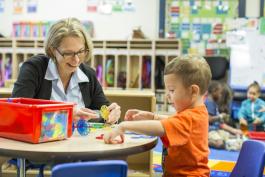Innovations in Early Development and Education: Bridging Research to Practice

On Saturday, September 26, 2015, the Early Development and Education group at Lehigh brought together early educators, parents of young children, home visitors, and undergrad and grad students to discuss the latest innovative evidence-based strategies to support early development and education.
Discussion topics included:
-
Supporting social-emotional and behavioral health
-
Developing language, early literacy and math skills
-
Promoting relationships between schools, families, and communities
The College of Education at Lehigh University provides professional learning opportunities for early childhood educators, early interventionists, and others supporting young children and their families.
Presentations:
Keynote: Conversation Compass: How to Promote Talk Among Peers, presented by Dr. Stephanie Curenton
Associate Professor, Rutgers University, Bloustein School of Planning & Public Policy; Adjunct Assistant Professor, Robert Wood Johnson Medical School, Institute for the Study of Child Development; Research Fellow, National Institute for Early Education Research; and Associate Faculty Member, Department of Educational Theory, Policy, and Administration, Graduate School of Education
Objects, Activities, and Interactions: Promoting Early Learning in the Classroom, presented by Dr. Robin Hojnoski
Classroom environments provide multiple opportunities to support young children's growth and development in critical early academic areas. This session will explore the ways in which we can use objects, activities, and interactions strategically and intentionally to promote early learning goals. Discussion will center on early mathematics and will integrate theory, research, and practical experience.
Culture and Class: Connections and Disconnections Between Schools and Families, presented by Dr. Peggy Kong
Fostering family-school relationships is important for children’s academic and social development. However, supporting and building positive family-school relationships in environments with limited resources continues to challenge families and schools. Poverty and diverse cultural beliefs about schooling shape the interactions between families and schools. Drawing from research conducted in poor rural communities in rural China, this session presents positive connections between families and schools as well as barriers that exist between them. A comparative discussion of the role of poverty, school culture, social connections, and families across contexts will suggest opportunities for bridging the gap between families and schools.
Enhancing and Expanding Parents' Facilitation of Their Infants and Toddlers Language Acquisition and Emergent Literacy, presented by Dr. Patti Manz
Parents' dialogues and interactions with infants and toddlers is a necessary ingredient for children's language development and fundamental literacy skills. This presentation will illustrate the Little Talks curriculum for use in early intervention programs, such as home visiting. Little Talks is a framework of parents' dialogic and book sharing behaviors that early interventionists can adapt to meet the individual needs of families. This presentation will provide an overview of the Little Talks content and process for collaboratively implementing it with families.
Project TAPP: A Partnership to Support the Language Development of Preschoolers, presented by Dr. Brook Sawyer
This session will describe an approach to blending the language expertise of parents with the pedagogical expertise of preschool teachers to support the language development of Spanish-English dual language learners.
A Systematic Approach to Designing Functional Assessment-Based Interventions: Addressing Challenging Behaviors in Preschools, presented by Dr. Brenna Wood
Challenging behaviors in preschool classrooms impact young children and their teachers. This session will focus on a unique approach to conducting functional behavioral assessments (FBA) and designing effective function-based interventions.
Engaging Parents: Supporting the Parent-Child Relationship to Promote Emotion Regulation and School Readiness, presented by Dr. Susan Woodhouse
This session will focus on research-informed practices to help children develop their capacity to manage difficult emotions, and will discuss research-based methods for engaging parents around these issues to promote positive behavior and school readiness.